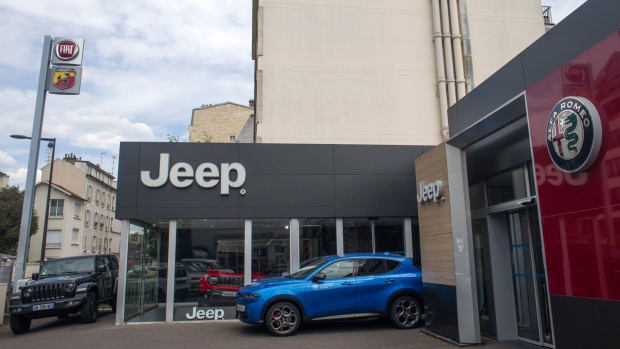May 3, 2023
Stellantis Sales Jump on High Car Prices, Recovery in Shipments
, Bloomberg News

(Bloomberg) -- Carmakers from Stellantis NV to Ford Motor Co. posted gains in the first quarter, but investors are signaling that the industry is headed for difficult times.
Stellantis dipped to a three-month low Wednesday after reporting disappointing sales in Europe where a downturn is looming as consumers feel the pinch of inflation and higher interest rates.
The results added to concerns felt at Ford, which said late Tuesday it anticipated more downward pressure on prices, now that supply-chain blockages have eased and more vehicles are being produced. While most luxury-car makers have proven less exposed — Porsche AG plans to boost prices in the US and Europe — manufacturers targeting mid-range buyers are already under pressure from successive price cuts by Tesla Inc.
“Incentives are increasing in the US, and we suspect this could lead to net price normalization as the year progresses,” RBC analyst Tom Narayan wrote in a note commenting on Stellantis’s result. The company’s first-quarter revenue climbed 14% to €47.2 billion ($52 billion), beating expectations.
What Bloomberg Intelligence Says:
Stellantis’ 21% inventory increase, an industry concern, and modest 3% revenue beat at €47.7 billion in 1Q, up 14% year-on-year, failed to impress. Vague 2023 guidance was reiterated of a double-digit operating margin and positive free cash. There were mixed performances in key regions with North America sales above expectations and Europe below.
— Michael Dean, BI automotive analyst
Stellantis 1Q Unimpressive - Inventory Rises, Europe Soft: React
Stellantis’s revenue in Europe gained after months of logistics snags left thousands of vehicles stranded, but the performance still missed expectations, Bernstein analyst Daniel Roeska wrote in a note to clients. Luxury brand Maserati’s pricing was “very weak,” he added.
The company’s prices are “overall appropriate” for now with improvements in some instances thanks to brand equity and attractive products, Chief Financial Officer Richard Palmer said on a call with analysts. The company “doesn’t directly compete” with Tesla and will stick to its electric-vehicle prices to maintain profitability, he added.
Still, the manufacturer will be ready to compete should pricing “become tighter” in the second half, he said.
The shares fell as much as 2.8% in Milan trading, the lowest level since Jan. 31.
Europe has emerged as a focal point for a downturn as consumers in the region feel the pinch from a cost-of-living crisis and higher interest rates. Mercedes-Benz AG last week said demand in Europe is falling behind strong US and Chinese markets.
“We have seen some relative slowdown in order intake a little bit, but we still have a very solid order bank,” CFO Palmer said. “Our main challenge continues to be fulfillment of orders,” particularly in Europe.
Stellantis has struggled with a lack of trains and truck drivers in Europe as well as integration hurdles from the PSA Group and Fiat Chrysler merger. The company has made progress with additional capacity and combining IT systems but also keeps facing higher outbound logistics prices, Palmer said.
Aston Martin
Aston Martin Lagonda Global Holdings Plc also reported first-quarter results Wednesday. The British manufacturer said the average selling price per car rose to £213,000 during the first quarter.
--With assistance from Monica Raymunt, Sabah Meddings and Gabrielle Coppola.
(Updates with additional CFO comment in fifth paragraph)
©2023 Bloomberg L.P.






